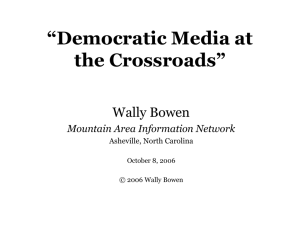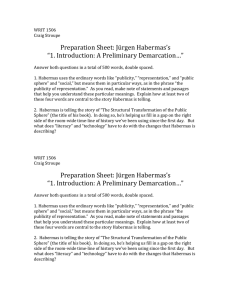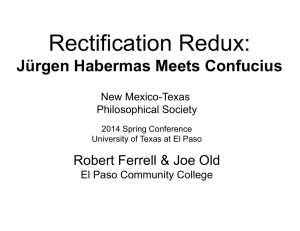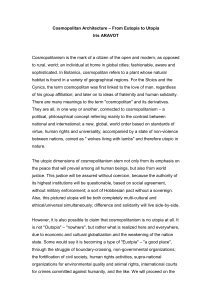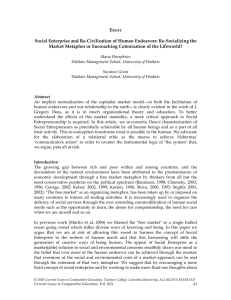Input I. History and memory culture and its impact on society... by Sonja Leboš
advertisement
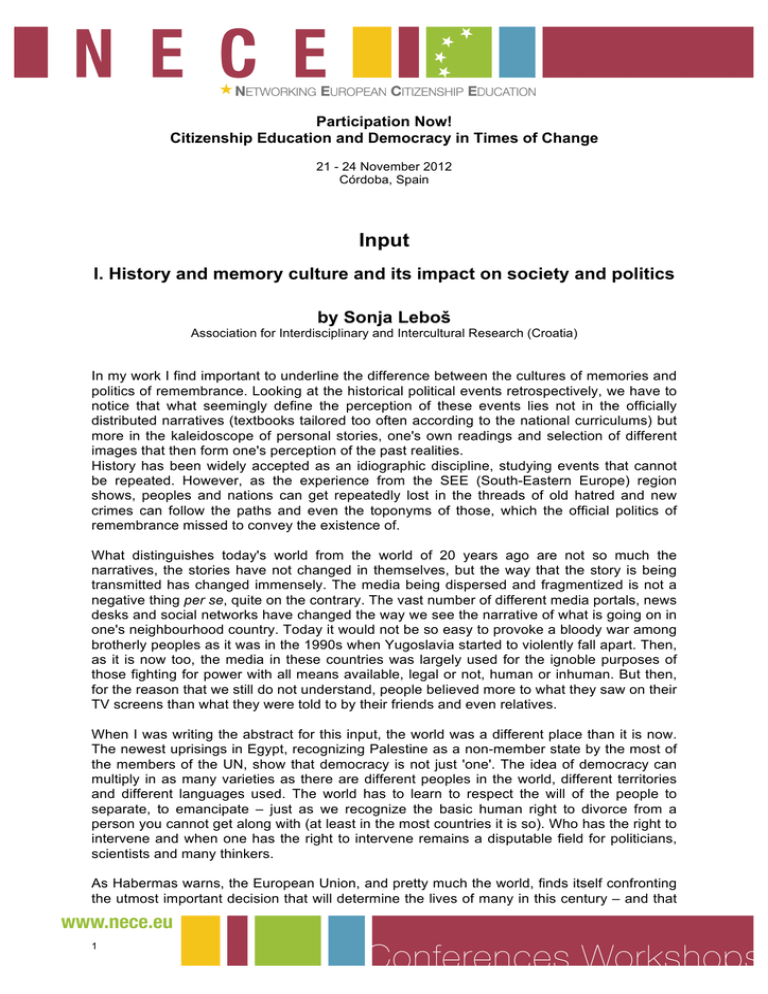
Participation Now! Citizenship Education and Democracy in Times of Change 21 - 24 November 2012 Córdoba, Spain Input I. History and memory culture and its impact on society and politics by Sonja Leboš Association for Interdisciplinary and Intercultural Research (Croatia) In my work I find important to underline the difference between the cultures of memories and politics of remembrance. Looking at the historical political events retrospectively, we have to notice that what seemingly define the perception of these events lies not in the officially distributed narratives (textbooks tailored too often according to the national curriculums) but more in the kaleidoscope of personal stories, one's own readings and selection of different images that then form one's perception of the past realities. History has been widely accepted as an idiographic discipline, studying events that cannot be repeated. However, as the experience from the SEE (South-Eastern Europe) region shows, peoples and nations can get repeatedly lost in the threads of old hatred and new crimes can follow the paths and even the toponyms of those, which the official politics of remembrance missed to convey the existence of. What distinguishes today's world from the world of 20 years ago are not so much the narratives, the stories have not changed in themselves, but the way that the story is being transmitted has changed immensely. The media being dispersed and fragmentized is not a negative thing per se, quite on the contrary. The vast number of different media portals, news desks and social networks have changed the way we see the narrative of what is going on in one's neighbourhood country. Today it would not be so easy to provoke a bloody war among brotherly peoples as it was in the 1990s when Yugoslavia started to violently fall apart. Then, as it is now too, the media in these countries was largely used for the ignoble purposes of those fighting for power with all means available, legal or not, human or inhuman. But then, for the reason that we still do not understand, people believed more to what they saw on their TV screens than what they were told to by their friends and even relatives. When I was writing the abstract for this input, the world was a different place than it is now. The newest uprisings in Egypt, recognizing Palestine as a non-member state by the most of the members of the UN, show that democracy is not just 'one'. The idea of democracy can multiply in as many varieties as there are different peoples in the world, different territories and different languages used. The world has to learn to respect the will of the people to separate, to emancipate – just as we recognize the basic human right to divorce from a person you cannot get along with (at least in the most countries it is so). Who has the right to intervene and when one has the right to intervene remains a disputable field for politicians, scientists and many thinkers. As Habermas warns, the European Union, and pretty much the world, finds itself confronting the utmost important decision that will determine the lives of many in this century – and that 1 is the choice between the transnational democracy and post-democratic executive federalism. Global economic dynamics, as Habermas also states, only fortifies the lack of democratic processes. The recent events in Slovenia, where the youth put forward the transparent with the picture of the Janez Janša, whereby he was 'adorned' with Hitler's moustache and the text on the transparent saying 'Even Hitler was elected', show the low respect of the young people towards representative democracy. Are they to be blamed? Habermas proposes 'Democratic self-determination means that the addresses of the laws are also simultaneously the authors of those laws' (Habermas, 49). Which strata’s in the societal organization must move in order that to happen? The power of imagination of the people looking towards the life-promising horizon is the plausible answer. More than probably ever before in the history of the world, its future, or better to say everybody's future depends on reaching the consensus about at least what is good for the planet. With the decisive power as it is constitutionalised at the present moment, to reach that consensus is hardly possible. When one reads or listens to Noam Chomsky it becomes clear that only pure luck saved the planet of the e.g. nuclear disaster of the large scale. For how long we can rely on the pure luck? Gambling is not the accountable behaviour, no matter how much profit it cashes in. Today, more than 20 years ago, when the war was dismembering the only then federal and multi-national state in Europe, the socialist Yugoslavia, the power of media is being fragmentized, deconstructed, and people are more prone to question each piece of news appearing in the mainstream media, relying on the virtual networks around the world which perhaps can tell them better about the events than the selective eye of the mainstream camera or highly budgeted newspapers. But just communicating the affairs is not enough to stop the massacre, to incite justice and peace. It is not enough to prevent vicious plans to be carried out. However, the communication among the people and among the peoples speaking different languages, today, when the translation of every language (basic, but still) is available easily as once was easy to take a feather out of the goose and write with it, it would be shameful not to use the tools of pervasive computing to enrich our lives with getting to know each other's cultures better. The citizens' education in that respect should instigate and work on people's curiosity to know one's land beyond the walled all-inclusive resorts. The attitude of the average people in the Central and Western Europe demonstrate difficult understanding of the present political and economical crisis in Europe. The hunger that today suffocates Greece tomorrow can be an issue in Hungary or Croatia. What will the European Community (if we want it to be a political union, we should think of it as 'community') do? It is not about sending the money, it is not about patching the hole in a state budget that is often a result of bad and corrupt governance rather then the result of people of one country being lazy or incapable. It is about the deep rupture of cultural and political misunderstanding among the countries of Europe every time when the continent faces an economical crisis: the worlds divide, not only on the axes of classes, but also on the borders where supposedly national interests start to play a main role. With that kind of attitude of the common people the European Union cannot serve as the developmental role model for any type of the political union. And that is a huge challenge for the European citizens' education nowadays: to promote intercultural understanding and mutual respect, the right on the emancipated political choice and the right on a peaceful protest. The politicians are also citizens – they are to be educated too. The question is not can we learn from history, but how we can learn from the history. One of my favourite forms of conveying the historical knowledge is the modality of oral history. By exchanging the values, standards, narratives and experience among themselves, so called 2 'small' people are empowered to take agency where yesterday they were manipulated by the abused media. That kind of exchange is slowly entering the scope of modalities that people have been used to apply when communicating about the past and present political affairs. We live in the world that has some features that has always had: the survivors of today are going to witness about that tomorrow. The witnesses of the third German Empire are dying as we speak. The witnesses of our present will in-form our future/s. As there is no one, and cannot be one and single form of democracy, there cannot be one and single vision of future. It is very important to notice that for the common future it is always important to find the common grounds of the common past/s. And there is always the common past, once when people start to communicate their own stories and not the stories that they were trained to remember as their own. The huge potential is being released – however, like always, the dealing with huge potentials has always been a contingent human issue. Many of the communicative tools handle mainly through photography, or rather, an image. As Sontag warned the image can be abused in many different ways. 'To an Israeli Jew, a photograph of a child torn apart in the attack on the Sbarro pizzeria in downtown Jerusalem is first of all a photograph of a Jewish child killed by a Palestinian suicide-bomber. To a Palestinian, a photograph of a child torn apart by a tank round in Gaza is first of all a photograph of a Palestinian child killed by Israeli ordnance. To the militant, identity is everything. And all photographs wait to be explained or falsified by their captions. During the fighting between Serbs and Croats at the beginning of the recent Balkan wars, the same photographs of children killed in the shelling of a village were passed around at both Serb and Croat propaganda briefings. Alter the caption, and the children's deaths could be used and reused.' The old rule of the press of putting forward 'shocking photographs' has produced a fatigue of the eye, but also of the soul. But now the image has been personalized: many people use and reuse different images and add their own comments and stories to it – whereby not just appropriating them, but even internalizing those images. The world has changed a lot since Virginia Woolf wrote about the photography’s of war, which were so rare in 1937. But, 75 years after, the human kind is not much swifter in preventing the horror from taking place, but the images of horror just became inevitable part of our daily life, mediatised first by the objective, and then by the medium: yesterday it was news-reel, today it is TV and the Internet. The accountability of the people provoking the horror remained the taboo – the civilization of accountability is still far from us. Part of the problem of the intercultural understanding in the mediatised world is certainly, what Sontag also warned about, the illusion of objectivity of the mediatised imagery. The reason, as she also explained, why the war in Bosnia so shocked Europe, was the fact that it was so near. The mediatised hunger in Africa does not shock anybody anymore – even the children in Austria or the UK will not pay attention to their coevals in Darfur if the images are mediated via large posters and hanged as the city lights in the big cities. But, they might internalize the image and feel some empathy if they 'share' that image and ask for help personally. However, that is still far from enough. As Noha El-Mikawy put forward in her introductory speech on the while quoting a poet: if people learn to handle power, without becoming vicious, perhaps that could help us all. And there is also a form of citizens' educational model to be practiced: which are the tools nowadays that can be used to prevent those in power to become vicious. We have seen some very interesting and very manifold practices that employ the digital tools for that 3 purpose – from Germany, Egypt and Tunis. And there I see the priority: to take those who hold power accountable for the vicious deeds. Even if we have to re-constitutionalise the basic premises of what the citizenship is about, as Habermas says 'because the citizens' society in the medium of the law is being constituted now' (Habermas, 56), I think we should not be afraid of the tremendous work we are facing. The prospective option to praise and reward that whom do good is a nice horizon to look forward to – what democracy initially was about. Also, it is necessary that the thought and intellectual work enable and mediate collective rational agency in time, before the violent street actions (like in Slovenia where the youth was gunned down with cold water yesterday) take over that role on the more permanent basis. Bibliography: Jürgen Habermas: Zur Verfassung Europas. Ein Essay. Sontag, Susan: Regarding the pain of the others. NY: Picador, 2003. 4


